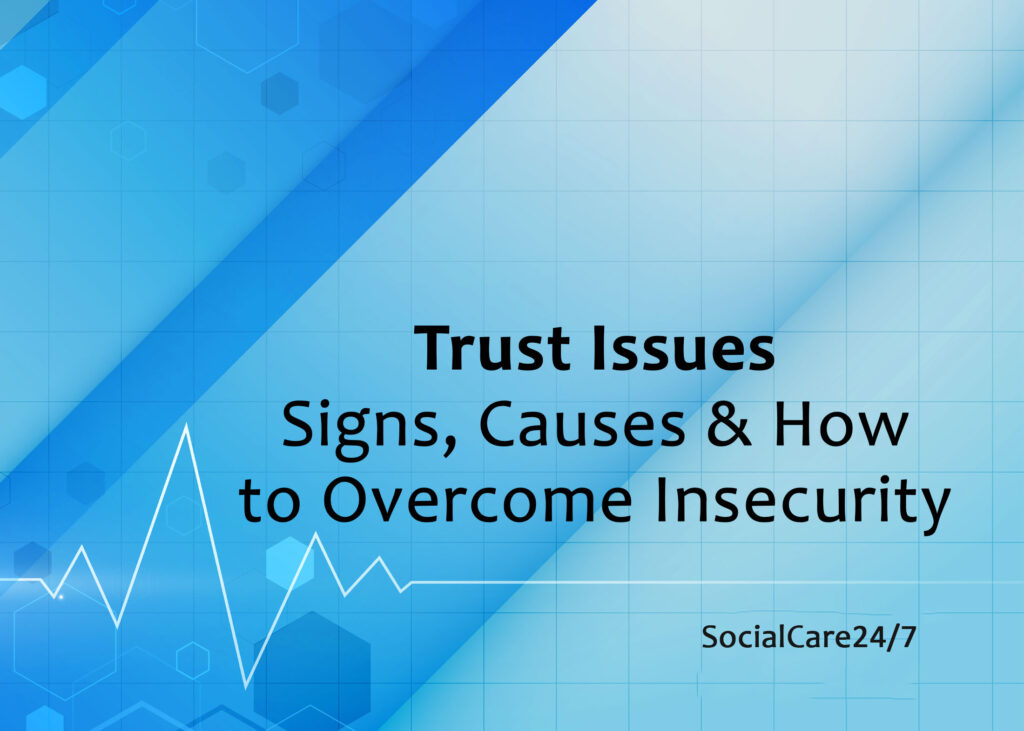Trust underpins all interpersonal relationships—family, friends, coworkers, and lovers. Trust issues can strain the most vital relationships, generating tension, misunderstandings, and mental distance.
People with trust issues may struggle to determine who to trust, how much to trust, and when to trust. In this article, we discuss trust difficulties, their causes, and real-world solutions.
What Are Trust Issues?
Trust issues make it hard to trust others, and broken trust makes it hard to trust again. Trust is the most vital aspect of any relationship, personal or professional. Deceived or abandoned people may assume treachery, expect dishonesty, and have trouble making new friends. Long-lasting betrayal sentiments might change how a person views people and their honesty.
Trust issues can arise in love, familial, friendship, and business relationships. To identify and fix trust issues, you must first recognise these indications.
Signs of Trust Issues
Knowing the indications of trust issues can help people understand their behaviour and improve relationships. Examples of common signs:
Assuming Betrayal: People with problems trusting others often assume someone has betrayed them without proof. This idea makes people defensive, preventing deeper connections.
Expecting Betrayal in the Future: Even if a lover, friend, or coworker has always been honest, people with problems trusting others may predict treachery. People may continually be sceptical and nervous because they worry others will let them down.
Overprotectiveness: People with problems trusting others may overprotect those they care about. This can manifest as dominating behaviour or fear of betrayal or abandonment by loved ones.
Refusing to Commit: People with trust issues frequently avoid commitment to avoid betrayal or rejection even if they love someone.
Trouble Forgiving: Trust issues can make even tiny mistakes feel like betrayals. They may have difficulty accepting and forgetting tiny mistakes because they regard them as evidence of bigger lying.
Isolation: People who have problems trusting others withdraw from others to avoid mental injury. This kind of solitude might make you depressed.
Constant Vigilance: After a great betrayal, people may watch for the “other shoe to drop.” They may not think they deserve good connections and worry that others will disappoint them.
Too Much Suspicion: Trust difficulties cause people to distrust others and suspect them of wrongdoing. They may distrust others’ honesty and motives even if they trust them.
Causes of Trust Issues
Bad prior experiences cause most trust issues. They frequently result from significant events or actions that make people distrust others’ honesty. Some common reasons:
Abandonment: A person who has been physically or emotionally abandoned may have trouble trusting others. They may not trust even their loved ones because they fear being alone again.
Betrayal: Friends, family, and love partners that betray you aren’t trustworthy. Once betrayed, people may be wary of trusting others.
Infidelity: One of the harshest forms of interpersonal betrayal is infidelity. It undermines trust in the relationship momentarily but can generate future trust issues.
Abuse & Mistreatment: Gaslighting, lying, and passive-aggressive behaviour can make it hard to trust someone. People feel upset and question others’ motives because of these activities.
Childhood Trauma: Abandonment or abuse by carers can make it hard to trust others. Children who feel unsafe can develop lifelong scars that damage their relationships.
Parental divorce or conflict: Children who witness their parents’ divorce or disputes may distrust others. They may take these events personally, especially in love relationships, because they believe all relationships end in abandonment or betrayal.
Nervous or avoidant attachment: Nervous or avoidant attachment types might make trusting others difficult. Nervous attachment sufferers fear rejection and don’t think they deserve love, making it hard to trust people.
Other Trauma: Even among adults, terrible experiences with doctors and nurses can make it hard to trust others. People who have lived through these may have trouble trusting others, especially in comparable situations.
How to Overcome Trust Issues?
If trust issues are harming your relationships and health, act now. Eight strategies to overcome trust issues:
Accept Trust Risk: Trust is risky. Remember that people will disappoint you, and nobody is flawless. That doesn’t imply you should end relationships when things go wrong. Limits can reduce the agony of trust breaches.
Understand how trust works: Some people are more trusting, while others are more sceptical. Allow someone to gain your trust first. Knowing how trust evolves can help you set realistic goals and strengthen relationships.
Take emotional risks: Honesty builds trust. Talk to others and take emotional risks. You can only build confidence in a new or post-breakup relationship by letting down your guard.
Find the Cause of Your Trust Issues: You must identify their cause to fix trust issues. Consider how prior events like betrayal or loneliness may have shaped your mood. If it will assist, acquire competent help with these issues.
Communicate Openly: Honesty builds trust. Discuss your issues with people you may not trust. Tell them your concerns and attempt to rebuild trust.
Focus on Trust-Building Relationships: Value your good relationships. These interactions remind you that you can trust others, that they care about you, and that they won’t break your trust.
Thank the People You Trust: Spend time thanking those you trust. Showing gratitude strengthens relationships and maintains trust.
Trusting Again: Like a muscle, trust gets stronger with usage. Regaining mistrust is fine. Keep going. Despite initial resistance, strive to trust again.
Conclusion
In the above, we discuss the signs, causes, and how to overcome trust issues. Trouble trusting others generally stems from past hurt, trauma, or abandonment. It can make you feel deceived or cause you to avoid commitments, harming relationships and health.
Knowing what causes trust issues and taking steps to rebuild them, such as being honest, taking emotional risks, and appreciating those who earn your trust, can help you repair relationships.



